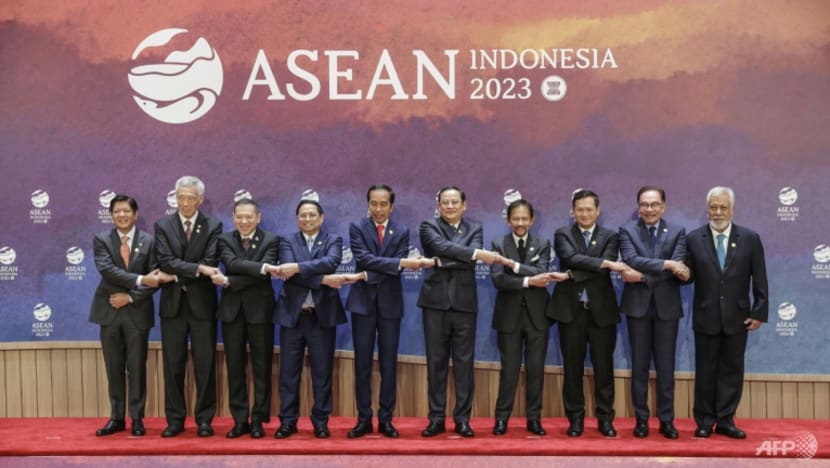ASEAN to set up troika mechanism of group’s rotating chairs to handle Myanmar crisis
The Philippines will also take over Myanmar as ASEAN chair in 2026.

ASEAN has been left divided over how to deal with Myanmar's rulers and other issues including Beijing's growing assertiveness in the South China Sea (Photo: POOL/AFP/Adi WEDA)
JAKARTA: Southeast Asian leaders have agreed to set up a “troika mechanism” comprising the immediate past, current and incoming chairs of their regional grouping to tackle the crisis in Myanmar, with the Philippines set to replace the junta-run country at the helm in 2026.
Analysts say the two moves by Association of Southeast Asian Nations (ASEAN) announced at its ongoing leaders’ summit will ensure unity and continuity in handling the Myanmar issue while minimising disruptions to the 10-member bloc’s programmes and activities.
Speaking to reporters on Tuesday (Sep 5), Indonesia’s Foreign Minister Retno Marsudi said the leaders reiterated the need to stop the violence in Myanmar while agreeing to establish a troika mechanism that would allow the immediate past, current and incoming ASEAN chairs to manage the crisis together and in a continuous manner.
“Because everyone understands that the situation cannot change in a year. And because of ASEAN’s commitment to continuously help the people of Myanmar, the implementation of a troika (mechanism) between current, previous and future chairs (is needed),” she said without elaborating.
Mdm Marsudi added that ASEAN leaders have also reviewed the implementation of the Five-Point Consensus put in place since April 2021, and decided that it should remain the main reference to address the ongoing political crisis in Myanmar.
Thousands of people have died and been internally displaced since Myanmar’s military seized power in a coup against the elected government of Nobel laureate Aung San Suu Kyi in February 2021.
What is the Five-Point Consensus?
During a meeting in April 2021, all ASEAN leaders reached a consensus about the situation in Myanmar.
The five points are:
First, there shall be immediate cessation of violence in Myanmar and all parties shall exercise utmost restraint.
Second, constructive dialogue among all parties concerned shall commence to seek a peaceful solution in the interests of the people.
Third, a special envoy of the ASEAN chair shall facilitate mediation of the dialogue process, with the assistance of the secretary-general of ASEAN.
Fourth, ASEAN shall provide humanitarian assistance through the AHA Centre.
Fifth, the special envoy and delegation shall visit Myanmar to meet with all parties concerned.
Mdm Marsudi also confirmed earlier reports in recent months that the Philippines would be taking over Myanmar’s scheduled chairmanship of ASEAN in 2026.
Earlier on Tuesday, Philippine President Ferdinand Marcos Jr had reportedly told fellow leaders that his country was ready to step in and replace Myanmar as ASEAN chair, which is rotated annually among member-states in alphabetical order of their names.
Speaking during the first day of a three-day ASEAN summit in Jakarta, President Marcos said: “It is my pleasure to announce that the Philippines is ready to take the helm and chair ASEAN in 2026.”
"We will fortify the foundations of our community-building and navigate ASEAN as it embarks on a new chapter,” he told his counterparts.
Referring to the troika as an informal consultation mechanism, Singapore’s Prime Minister Lee Hsien Loong told fellow leaders that it would settle the issue of future chairmanships particularly for 2026, while “allowing ASEAN to continue its important agenda, notwithstanding the troubled situation in Myanmar”.
“This is the way, by remaining united on key regional issues, and giving major powers a meaningful stake in our region, that ASEAN can ensure its continued relevance and centrality to our peoples,” he added.
A statement released by ASEAN said the leaders also agreed on supporting any effort by member-states in coordination with the group's chair to address the crisis in Myanmar that is in line with the Five-Point Consensus.
CRISIS IN MYANMAR EXPECTED TO CONTINUE
Analysts say the Myanmar crisis has divided ASEAN, with the bloc last year making a rare decision to leave the military junta out of the grouping’s twice-yearly leaders’ summits and foreign ministers' meetings.
Jakarta-based international relations expert from non-governmental organisation Centre of Strategic and International Studies (CSIS) Lina Alexandra believes that the move to replace Myanmar with the Philippines as ASEAN chair in 2026 means that the crisis there is forecast to continue till then.
“Looking at the complexity of the crisis, it is unlikely it will be resolved in the next three years.
“This crisis has made ASEAN not united, but this decision (to give the chairmanship to the Philippines) will restore that unity,” said Mdm Alexandra.
She added that Myanmar would not have been able to fulfil its duties as ASEAN chair in 2026 due to the logistics involved, including hosting numerous meetings and summits.
The rotating ASEAN chair would need to prepare the agenda for the chairmanship at least a year or two in advance, and Mdm Alexandra believes that this would be difficult for Myanmar given the current situation in the country.
Associate Professor Dinna Prapto Raharja, the executive director of think-tank Synergy Policies, said the move to skip Myanmar from the chairmanship signals that it is a very fragile country compared to the rest of the ASEAN members.
“ASEAN could have done more for Myanmar … there is very little probability that Laos, as the next chair, would be able to solve this problem,” she said.
As Southeast Asia's largest economy and one of the founding fathers of ASEAN, Indonesia has long been touted as the group's big brother. On the other hand, Laos is a smaller country and only joined ASEAN in 1997, 30 years after the establishment of the group.
“If it’s being delayed until Malaysia becomes chair or even the Philippines, it is unacceptable.”
Assoc Prof Raharja recalled that this had happened before in 2006 when Myanmar was also skipped over as ASEAN chair, amid fears that Western countries would boycott it amid an economic embargo.
Membership of the proposed troika mechanism will also be rotating, sources told CNA.
For instance, if in operation today, it will comprise Cambodia as the previous ASEAN chair, Indonesia as the current chair, and Laos as the incoming chair. Come next year, it will comprise Indonesia, Laos and the next incoming chair Malaysia.
Associate Professor Teuku Rezasyah from Bandung’s Padjadjaran University believes the troika mechanism is a “good idea” as it enables a continuity of programmes and ensures that countries “work together” on issues.
“For example when Laos is chair next year, it would need to work together with this year’s chair Indonesia and the chair of 2025 Malaysia,” said Assoc Prof Rezasyah.
This, he stressed, means that programmes put forward during Indonesia’s ASEAN chairmanship will not be undone by Laos, which has taken a more conciliatory stance compared to Indonesia's vocal approach in condemning the violence in Myanmar.
Meanwhile, Myanmar’s junta said on Tuesday that it will likely hold elections in 2025, with 36 political parties granted permission to take part in any future polls.
Assoc Prof Rezasyah said he hopes the election will be designed with the intention to restore democracy in the country.
“Hopefully the election is designed with good intentions and a belief in democracy in Myanmar, rather than an opportunity to count its (the military’s) friends and enemies,” he said.
















